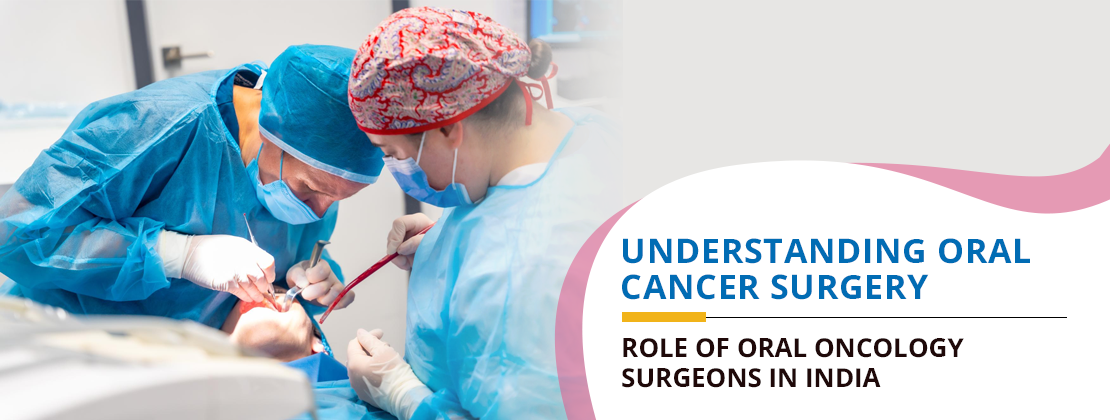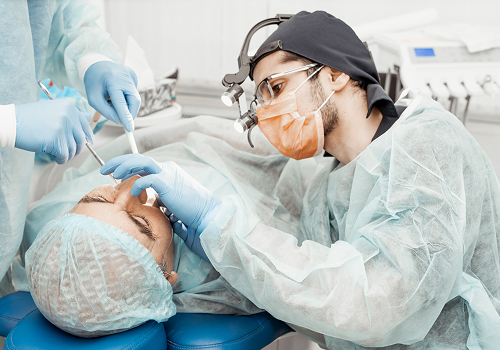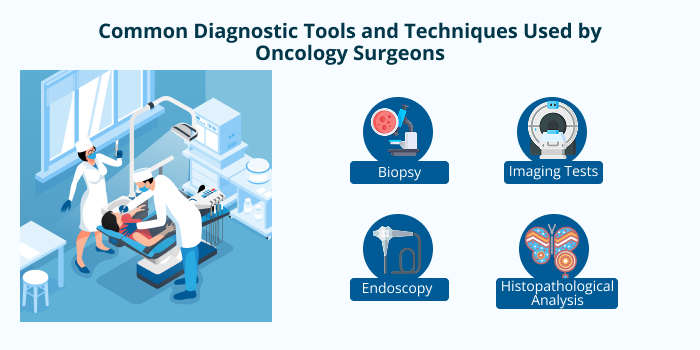
Home / Blog / Understanding Oral Cancer Surgery: Role of Oral Oncology Surgeons in India
Table of Contents
Oral cancer is one of the most common cancers in India, with over 143,700 new cases reported annually (Globocan 2022). The consumption of tobacco, alcohol, and betel nut is closely associated with the increased incidence of oral cancer across the country, especially in the northeastern parts of India. Oral cancer is a condition that mostly needs specialised treatment; hence the importance of an oral oncology surgeon.

An oral oncology surgeon refers to someone with expertise in performing surgeries on the mouth, jaws, face, and other cancers also. These specialists play a pivotal role in oral cancer management.
They work closely with oncologists, ENT surgeons, and radiation specialists, making them an indispensable part of expert teams at leading cancer hospitals, like HCG Hospitals, Bhavnagar.
In oral cancer management, an oncology surgeon, or the oral oncology surgeon, will work closely with the plastic surgeon and other specialists in order to develop a treatment plan that will not only deliver positive health outcomes but also improve the quality of life for patients.
The following are the different surgical approaches wherein oncology surgeons work with plastic surgeons and other rehabilitation experts:
This multidisciplinary approach improves survival rates and quality of life for patients.
Additional Reading: Advanced Techniques in Cancer Surgery at HCG Hospitals

Oral cancer can form anywhere in the mouth and throat regions. Some of the most common types are as follows:
Regrettably, 60-70% of oral cancer cases in India are detected at a late stage because people do not have enough information, and they seek medical attention when it is too late.
Paying attention to persistent symptoms and seeking timely medical interventions are essential for effective oral cancer management.
Additional Reading: Get Expert Help for Oral Cancer: Know the Stages and Treatment Options | HCG Hospitals

Different diagnostic methods are recommended by oral cancer specialists in general:
With the advancement of surgical techniques, oral cancer surgery outcomes have significantly improved. Depending on the stage, patients may either undergo one cancer treatment or a combination of cancer treatments. However, studies show that multimodal approaches play a huge role in effective disease control.
As a leading cancer hospital in Bhavnagar, HCG Hospitals offers comprehensive cancer care at a reasonable cost. The hospital has partnered with various reputable insurance companies to facilitate a seamless cancer journey for its patients.
Even though surgery is still considered the main form of treatment, it is crucial to prevent oral cancer. The reason why India has such a huge burden of oral cancer cases, almost 30% globally, is because of the high prevalence of tobacco and betel nut chewing in this country. The following may be some of the effective preventive measures against oral cancer:
Survival rates of over 70% are possible for patients with oral cancer at stages I or II, but they drop to under 30% in the case of advanced stages. Thus, early detection and timely interventions become all the more important.
Additional Reading: 10 Lifestyle Changes to Lower Your Cancer Risk
The care of patients after undergoing surgery for oral cancer is very important, although it is usually ignored. After oral cancer surgery, patients often experience difficulties with speech and swallowing. The oral cancer specialists work together with speech therapists and nutritionists to make sure that patients cope well.
As a leading multispeciality hospital in Bhavnagar, HCG Hospitals emphasises comprehensive survivorship programmes for oral cancer patients, ensuring that patients not only survive but also thrive after treatment.
Oral cancer remains a major public health challenge in India, but with timely intervention, recovery and survival are possible. At the front line of this battle are oncology surgeons who perform surgeries that save lives as well as assist in reconstructive and rehabilitative care to enable patients to have their normal lives back.
Individuals belonging to the high-risk category should consider regular check-ups at a leading cancer hospital to put themselves a step ahead of cancer.